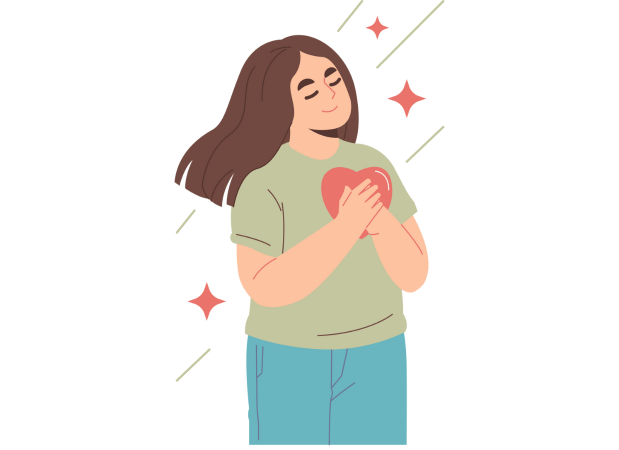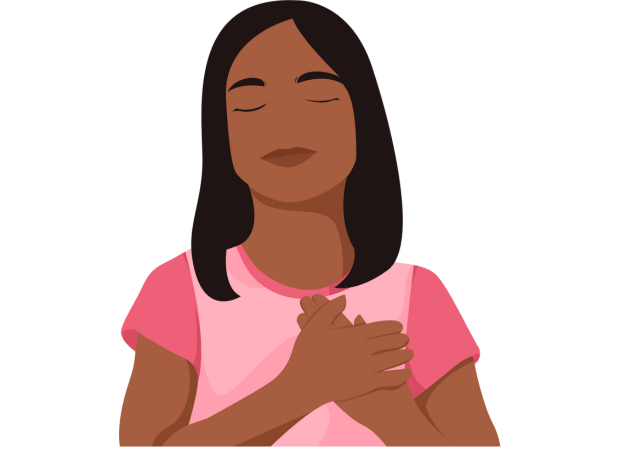Here’s How Gratitude Changes Your Brain and Saves Your Sanity from Heartbreak

Alright, queens, let’s talk about gratitude. I know, I know. You just got dumped, ghosted, or maybe you’re stuck in the post-breakup blues, and here I am, telling you to be grateful. Like, really? But hear me out because gratitude isn’t just about writing cheesy “Dear Diary” notes about sunsets and lattes. It’s a powerhouse that rewires your brain, boosts your mood, and helps you heal like the heartbreak warrior you are.
In fact, science says gratitude can do wonders for your mental health — and if you’re ready to kick the breakup blues to the curb, this might just be the secret weapon you’ve been looking for.
What Is Gratitude And Why Should You Care?
Gratitude isn’t just a buzzword influencers throw around with their pumpkin spice vibes. It comes from the Latin word gratia, meaning grace, gratefulness, or thankfulness. It’s all about appreciating the good in your life — whether it’s a supportive friend, a killer playlist, or that perfect croissant you had last week.
But it’s more than just warm fuzzies. Gratitude connects you to something bigger than yourself, whether it’s other people, nature, or even the universe (if you’re into that). And when you’re recovering from heartbreak, feeling connected is exactly what your soul needs.
How Gratitude Changes Your Brain (No, Really)
You might be wondering how something as simple as gratitude can have such a profound impact on your brain. Well, let’s dig deeper into the science, queen.
Gratitude activates the brain’s reward system, lighting up areas like the medial prefrontal cortex and the anterior cingulate cortex—regions responsible for emotional regulation, empathy, and decision-making. This means that every time you practice gratitude, you’re essentially giving your brain a little workout in emotional resilience.
Studies have shown that practicing gratitude increases the production of serotonin (the happiness neurotransmitter) and dopamine (the brain’s “reward chemical”). These neurotransmitters act like natural antidepressants, lifting your mood and helping you feel more optimistic about life, even when it feels like your world just crumbled.
But it gets even better. Research from the Greater Good Science Center at UC Berkeley found that gratitude can physically reshape your brain. In one study, participants who practiced gratitude for three weeks showed increased neural sensitivity in the prefrontal cortex, the area of the brain associated with decision-making and learning. Translation? Gratitude helps you make smarter, healthier choices—like not texting your ex at 2 a.m.
Gratitude as a Stress Buster
When you’re in heartbreak mode, your stress response is often in overdrive. Your body pumps out cortisol, the stress hormone, which can wreak havoc on your mood, immune system, and even your sleep. Gratitude, however, helps regulate this response.
Here’s how it works: gratitude shifts your brain from a state of survival (fight-or-flight) to a state of growth and relaxation (rest-and-digest). When you focus on what you’re grateful for, your parasympathetic nervous system kicks in, calming your heart rate, lowering your blood pressure, and telling your body, “Hey, it’s okay to chill.”
The Science of Perspective Shifting
Heartbreak has a way of making your problems feel like the center of the universe. Gratitude offers a reality check. By focusing on the good—whether it’s a supportive friend or the fact that the sun came out today—you shift your perspective. This isn’t just emotional fluff; it’s backed by research.
A study published in Frontiers in Psychology found that gratitude training helped participants reframe negative experiences and find meaning in their struggles. When you’re grateful, you’re less likely to ruminate on what went wrong and more likely to recognize the lessons, growth, and opportunities ahead.
Gratitude and Physical Health:
Believe it or not, gratitude doesn’t just heal your heart; it heals your body too. Studies by Dr. Robert Emmons, a leading gratitude researcher, show that people who practice gratitude consistently report fewer aches and pains, better sleep, and higher energy levels. In one study, participants who kept a gratitude journal slept longer and reported feeling more refreshed in the morning compared to those who didn’t.
Another fascinating study from the National Institutes of Health found that gratitude stimulates the hypothalamus, the part of your brain that regulates critical bodily functions like sleep, metabolism, and stress. This means gratitude doesn’t just make you feel better emotionally—it makes you healthier physically.
Gratitude’s Ripple Effect
Heartbreak often makes us feel isolated, but gratitude can help rebuild connections. A study from the University of Kentucky found that people who practice gratitude are more likely to be empathetic and forgiving, making it easier to mend and strengthen relationships.
When you focus on what you’re grateful for in others—like a friend who always shows up or a family member who listens without judgment—you create a positive feedback loop. This not only boosts your relationships but also reinforces your support system, which is crucial during a breakup.
The Bottom Line
Gratitude isn’t just some fluffy self-help concept; it’s a scientifically proven tool for rewiring your brain, calming your stress, and boosting your overall well-being. So grab that journal, queen, and start counting those blessings—your brain (and heart) will thank you.

How Gratitude Works Its Magic
Let’s break this down:
- It calms your chaos: When your ex’s texts (or lack thereof) have your heart racing, gratitude slows down your nervous system and says, “Breathe, babe. We got this.”
- It rewires your perspective: Gratitude forces you to focus on what’s right in your life instead of what went wrong. That energy shift? Major glow-up vibes.
- It boosts your mood: Gratitude releases dopamine and serotonin — your brain’s natural happy pills. Forget about crying into your ice cream; gratitude has a better fix.
- It strengthens relationships: Thanking people (even mentally) fosters connection and trust. Gratitude helps you see the good in others, which is crucial when rebuilding your support system post-breakup.
Why Heartbreak and Gratitude Go Hand in Hand
When you’re in the thick of a breakup, it’s easy to spiral into negativity. Your brain loves to cling to the hurt, replaying those last arguments or those “what if” scenarios. Gratitude helps break that cycle by shifting your focus to what you dohave instead of what you’ve lost.
Here’s the deal: heartbreak doesn’t just mess with your emotions; it messes with your body, too. Stress hormones skyrocket, and your nervous system goes haywire. Gratitude steps in as the ultimate superhero, calming your stress response and grounding you in the present.
And let’s not forget: practicing gratitude doesn’t mean you’re grateful for the heartbreak itself. (We’re not thatdelusional.) It means finding gratitude in the lessons, the growth, and the people who’ve had your back along the way.
How to Practice Gratitude (Even When You’re a Hot Mess)
Gratitude sounds great in theory, but how do you actually make it a part of your life, especially when you’re crying into your pillow at 2 a.m.? Don’t worry, queen — I’ve got your back. These practical tips will help you embrace gratitude even if your life feels like a beautiful, chaotic mess right now.
- Write a Thank-You Letter (Or Just Think About It)
Channel your inner Jane Austen (or Emily Dickinson, if you’re feeling extra poetic) and write a heartfelt letter to someone who’s brought light into your life. It could be your mom, your bestie, or even your favorite teacher from high school. Pour your heart out and tell them exactly why they mean so much to you. Feeling too overwhelmed to write it down? That’s okay! Just take a moment to mentally thank them. Gratitude works its magic whether it’s scribbled on paper, typed into your Notes app, or whispered into the void. Bonus points if you actually send the letter—it could strengthen your bond and make someone’s day. - Start a Gratitude Journal
This one’s a classic for a reason. Grab a cute notebook (or that fancy planner you bought but never used) and dedicate a few minutes each night to jotting down three things you’re grateful for. Don’t overthink it! The things can be as big as your career win or as small as the barista who got your oat milk latte just right. Keep it consistent by turning this into part of your nightly wind-down ritual. Light a candle, sip some tea, and let those gratitude vibes flow. Pro tip: Revisit your journal whenever you’re having a bad day. It’s like a warm hug from your past self. - Count Your Blessings (Literally)
Set aside five minutes every week to reflect on the good in your life. Take a pen and paper (or the Notes app, if that’s more your style) and start listing. Be specific! Instead of writing “I’m grateful for my friends,” try, “I’m grateful for Sarah’s hilarious memes that make me snort-laugh,” or “I’m thankful for Lisa, who drove 30 minutes just to sit with me when I was a wreck.” By focusing on the details, you’ll make your gratitude practice feel more tangible and meaningful. Bonus: The more specific you are, the easier it’ll be to notice and appreciate the little things in real-time. - Meditate on Gratitude
Mindfulness meditation isn’t just for yogis or wellness influencers—it’s for anyone who wants to reclaim their sanity (aka all of us). Find a quiet spot, close your eyes, and take a few deep breaths. Then, start focusing on the things you’re grateful for. Picture them vividly—like the way your best friend’s laugh lights up the room or how your favorite song always gives you goosebumps. Let those good vibes sink in and stay with you. Not sure where to start? Try a guided meditation app or YouTube video focused on gratitude. Even a five-minute practice can leave you feeling calmer and more grounded. - Celebrate the Little Wins
Gratitude doesn’t have to be deep or life-changing. Sometimes, it’s about acknowledging the small victories that keep you going. Maybe you didn’t drunk-text your ex last night (bravo, queen!), or your eyeliner turned out flawless on the first try. Celebrate those moments! Even the tiniest win is proof that you’re capable of moving forward, one step at a time. Keep a running list of these little wins to look back on when you need a pick-me-up. - Incorporate Gratitude into Your Routine
Make gratitude a habit by tying it to something you already do daily. Maybe it’s saying a quick “thank you” to the universe before your morning coffee or listing one thing you’re grateful for during your commute. By attaching gratitude to a regular activity, it becomes second nature—and trust me, that’s when the magic starts happening. - Share Your Gratitude
Don’t keep those good vibes to yourself! Text a friend and let them know why you appreciate them. Post a shoutout on social media to someone who’s been there for you. When you share gratitude, you not only brighten someone else’s day but also reinforce those positive feelings in your own mind. It’s a win-win.

Why Gratitude Is a Skill (Not a Personality Trait)
Here’s the tea: gratitude isn’t something you’re born with; it’s something you build. Think of it like a muscle. The more you flex it, the stronger it gets. And just like working out, it might feel awkward or uncomfortable at first. But stick with it, and you’ll notice a shift in your mindset, your mood, and your life.
From Breakup Blues to Gratitude Queen
Let’s keep it real: heartbreak sucks. But gratitude doesn’t just help you survive; it helps you thrive. It shifts your focus from the pain of the breakup to the beauty of what’s ahead. It reminds you that you’re stronger, wiser, and more resilient than you think. And when you embrace gratitude, you don’t just heal; you glow.
Final Thought: Gratitude Is Your Glow-Up
By now, you might be thinking, “Okay, I’ll try this gratitude thing.” And good for you, queen, because gratitude isn’t just a feel-good exercise; it’s a life-changing practice. It’s the secret to moving on, leveling up, and living your best life post-breakup.
So, grab your journal, light a candle, and start counting those blessings. And when you’re done? Scroll back up and read this article again because, trust me, the more you soak in this wisdom, the closer you’ll get to your ultimate breakup glow-up.
Oh, and before you go, remember: healing is not a straight line, and you’re allowed to take it one step at a time. Trust yourself, lean into gratitude, and watch how it transforms your heartbreak into your greatest comeback.
Ready to Take Your Healing to the Next Level?
If you’re ready to dive deeper into your healing journey, don’t miss out on these breakup essentials:
Follow us on Instagram for more breakup wisdom and queen-level vibes, and don’t forget to share this post with your bestie who might need a little gratitude boost. 💖

